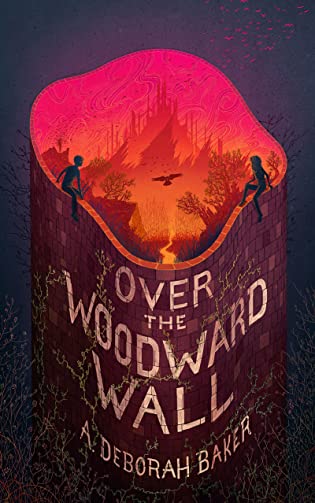 Over the Woodward Wall (The Up-and-Under, #1) by A. Deborah Baker
Over the Woodward Wall (The Up-and-Under, #1) by A. Deborah Baker Format: eARC
Source: supplied by publisher via Edelweiss
Formats available: hardcover, ebook, audiobook
Genres: fantasy, portal fantasy, young adult
Series: Up-and-Under #1
Pages: 204
Published by Tordotcom on October 6, 2020
Purchasing Info: Author's Website, Publisher's Website, Amazon, Barnes & Noble, Kobo, Bookshop.org
Goodreads
If you trust her you’ll never make it home…
Avery is an exceptional child. Everything he does is precise, from the way he washes his face in the morning, to the way he completes his homework – without complaint, without fuss, without prompt.
Zib is also an exceptional child, because all children are, in their own way. But where everything Avery does and is can be measured, nothing Zib does can possibly be predicted, except for the fact that she can always be relied upon to be unpredictable.
They live on the same street.They live in different worlds.
On an unplanned detour from home to school one morning, Avery and Zib find themselves climbing over a stone wall into the Up and Under – an impossible land filled with mystery, adventure and the strangest creatures.
And they must find themselves and each other if they are to also find their way out and back to their own lives.
My Review:
 If Alice’s Adventures in Wonderland was the grandparent book, and Narnia and Oz were the parent books – but wait, there’s another generation in there. If Alice was the great-grandparent, Narnia and Oz were the grandparents and Seanan McGuire’s Middlegame was the parent – perhaps with her Wayward Children series as the aunts and uncles – you’d get something like Over the Woodward Wall, and hopefully the following books in The Up-and-Under series, as the book-children.
If Alice’s Adventures in Wonderland was the grandparent book, and Narnia and Oz were the parent books – but wait, there’s another generation in there. If Alice was the great-grandparent, Narnia and Oz were the grandparents and Seanan McGuire’s Middlegame was the parent – perhaps with her Wayward Children series as the aunts and uncles – you’d get something like Over the Woodward Wall, and hopefully the following books in The Up-and-Under series, as the book-children.
Not that Over the Woodward Wall isn’t perfectly understandable and enjoyable without having read any of the above. But if you’re familiar with any of them, you can kind of see them looking on with pride and possibly a bit of chagrin, as all progenitors sometimes do, at the actions of their new and often unruly and less than well behaved descendent.
At least Zib is poorly behaved, according to some lights. Including her fellow adventurer Avery when this story begins.
It’s hard to get the comparisons to Wonderland, Narnia and Oz out of your head while reading Over the Woodward Wall. If Wonderland had physically reached out and grabbed Alice, instead of just grabbing her emotionally or psychologically, and if she’d been operating on the buddy system, the beginning of her story might be even closer to Woodward Wall.
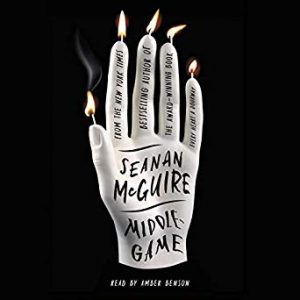 Like Wonderland and Narnia, there are four kings and queens – or there are supposed to be four kings and queens. But the royals currently in office are all rather like the Wicked Witch of the West, or the White Witch in Narnia. While the road that Zib and Avery are traveling on, like the Yellow Brick Road of Oz, is neither as straight nor as without danger as the locals claim it to be. Although Zib and Avery’s companions, the Crow Girl and the Drowning Girl, while they are certainly missing something essentially it’s nothing so straightforward as brains, a heart or even the nerve, nor is it going to be as simple to discover how to get them back.
Like Wonderland and Narnia, there are four kings and queens – or there are supposed to be four kings and queens. But the royals currently in office are all rather like the Wicked Witch of the West, or the White Witch in Narnia. While the road that Zib and Avery are traveling on, like the Yellow Brick Road of Oz, is neither as straight nor as without danger as the locals claim it to be. Although Zib and Avery’s companions, the Crow Girl and the Drowning Girl, while they are certainly missing something essentially it’s nothing so straightforward as brains, a heart or even the nerve, nor is it going to be as simple to discover how to get them back.
In the end, this is a story about friendship, and about being true to yourself above all, and about loyalty. It’s also a story about learning that even as a child, the world is neither as safe nor protected as you might want it to be, and that you need to learn to take care of yourself and your choices – with a little bit of help from the friends you find along the way.
Escape Rating B+: A. Deborah Baker is Seanan McGuire writing not so much under a pen name but rather under the name of a character she created in Middlegame. Bits and pieces of the stories in The Up-and Under were introduced in Middlegame as stories written by a character in the book named A. Deborah Baker, all of which serves to explain where this series comes from and why it’s under a new pseudonym for the author who already writes as Mira Grant and Seanan McGuire.
 The irony for this reader is that I liked this story – maybe not quite as much as Every Heart a Doorway and Across the Green Grass Fields, but still quite a lot – even though I bounced hard off Middlegame and never went back to it. I’m starting to believe that the answer is that I like this author in smaller chunks, possibly because her style of fairy tale feeling stories for adults works better for me in the shorter form.
The irony for this reader is that I liked this story – maybe not quite as much as Every Heart a Doorway and Across the Green Grass Fields, but still quite a lot – even though I bounced hard off Middlegame and never went back to it. I’m starting to believe that the answer is that I like this author in smaller chunks, possibly because her style of fairy tale feeling stories for adults works better for me in the shorter form.
While this story reminds me a lot of its antecedents, it’s also different from all of them in a way that feels more interesting and more realistic. Oz and Wonderland both turned out to be dreams rather than reality. Narnia was real, for select definitions of real, but even though the Pevensie children spent decades in Narnia and reached adulthood there, when they returned to the real world they remembered Narnia and all their experiences there BUT they returned to being children as if no time had passed at all. Even odder, they returned seemingly unaffected and unchanged by their decades of extra life experience.
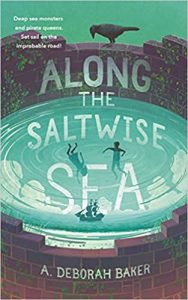 Zib and Avery are changing all the time, and as we learn at the end of the story, real time is passing both for them and for their parents back home. While on the one hand this feels like a fairy tale, on the other it definitely reads like a journey with consequences. Zib and Avery have an important mission to complete in the Up-and-Under, and their experiences in that world have already changed them from who they were – and who they would have become as a result. They already see the world differently, and it feels like those changes are going to have long-term effects, just as the children’s journeys do in Wayward Children.
Zib and Avery are changing all the time, and as we learn at the end of the story, real time is passing both for them and for their parents back home. While on the one hand this feels like a fairy tale, on the other it definitely reads like a journey with consequences. Zib and Avery have an important mission to complete in the Up-and-Under, and their experiences in that world have already changed them from who they were – and who they would have become as a result. They already see the world differently, and it feels like those changes are going to have long-term effects, just as the children’s journeys do in Wayward Children.
We’ll certainly have time to find out, as Zib and Avery’s journey in the Up-and-Under continues in Along the Saltwise Sea later this year. They’re going to sail with a pirate queen!

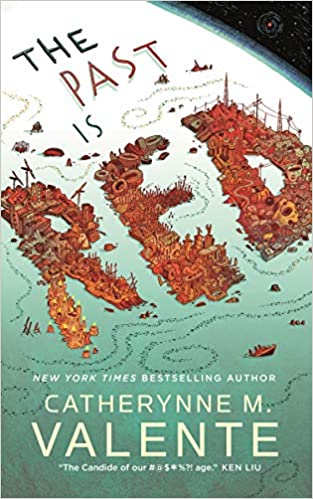 The Past Is Red by
The Past Is Red by 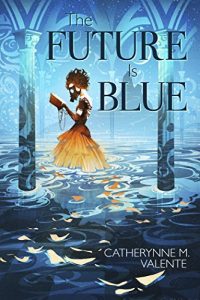 But the way the story is told is not linear. We see Tetley in her present, and then how she got that way, and then see her later in her life, and how she got there, with occasional daydreams of what should have been but wasn’t mixed in. It all added to the mythical feel of the story, but also made it lose a bit of clarity.
But the way the story is told is not linear. We see Tetley in her present, and then how she got that way, and then see her later in her life, and how she got there, with occasional daydreams of what should have been but wasn’t mixed in. It all added to the mythical feel of the story, but also made it lose a bit of clarity.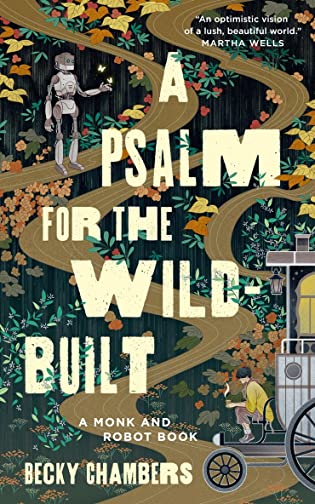 A Psalm for the Wild-Built (Monk & Robot, #1) by
A Psalm for the Wild-Built (Monk & Robot, #1) by  I was hoping that whatever I got would be as good as
I was hoping that whatever I got would be as good as 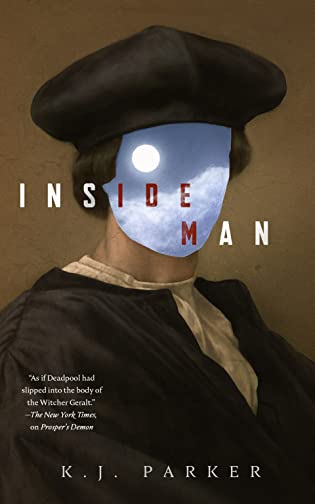 Inside Man by
Inside Man by  I picked up Inside Man because I was tempted by
I picked up Inside Man because I was tempted by  There were points where I had to double check to be sure that I hadn’t accidentally downloaded The Screwtape Letters instead. If you’re not familiar, Screwtape is a senior demon straight out of the mind of C.S. Lewis – and dedicated to his good friend J.R.R. Tolkien, which I how I first made Screwtape’s acquaintance.
There were points where I had to double check to be sure that I hadn’t accidentally downloaded The Screwtape Letters instead. If you’re not familiar, Screwtape is a senior demon straight out of the mind of C.S. Lewis – and dedicated to his good friend J.R.R. Tolkien, which I how I first made Screwtape’s acquaintance.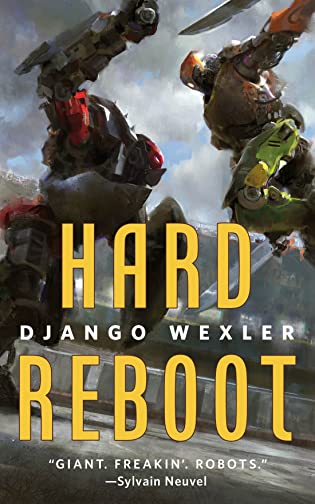 Hard Reboot by
Hard Reboot by 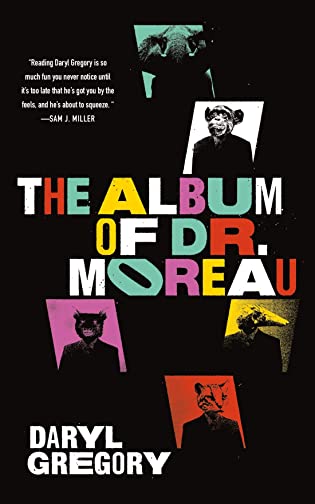 The Album of Dr. Moreau by
The Album of Dr. Moreau by  The SF is in the boyz themselves. However they came to exist – which isn’t revealed until the end – the kind of genetic manipulation required to blend animal and human DNA into a person with traits from both sides of that equation is science gone in a direction we haven’t managed yet. (And this is what this story takes from its progenitor. You don’t have to read
The SF is in the boyz themselves. However they came to exist – which isn’t revealed until the end – the kind of genetic manipulation required to blend animal and human DNA into a person with traits from both sides of that equation is science gone in a direction we haven’t managed yet. (And this is what this story takes from its progenitor. You don’t have to read 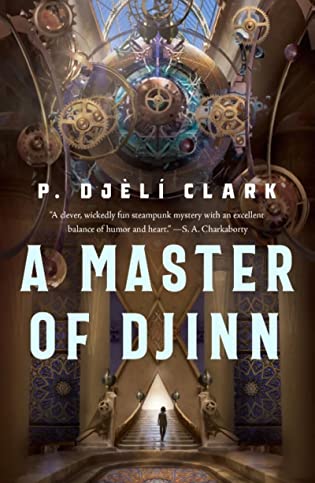 A Master of Djinn by
A Master of Djinn by 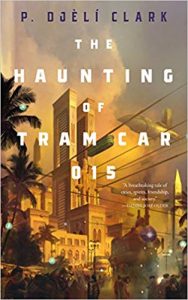 Escape Rating A++: Honestly, I want to just sit here and squee. A lot. This was amazingly awesome from beginning to end and I don’t say that lightly. This is one of those stories that made me think pretty much all the thoughts and I’m still reeling a bit from the absolutely epic book hangover.
Escape Rating A++: Honestly, I want to just sit here and squee. A lot. This was amazingly awesome from beginning to end and I don’t say that lightly. This is one of those stories that made me think pretty much all the thoughts and I’m still reeling a bit from the absolutely epic book hangover. Across the Green Grass Fields (Wayward Children, #6) by
Across the Green Grass Fields (Wayward Children, #6) by 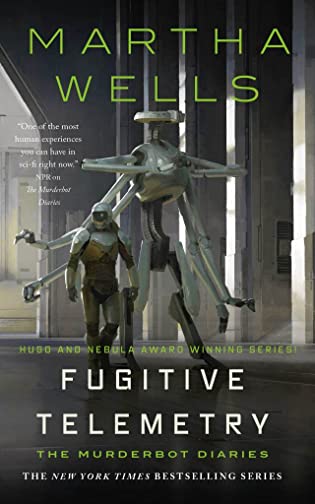 Fugitive Telemetry (The Murderbot Diaries, #6) by
Fugitive Telemetry (The Murderbot Diaries, #6) by 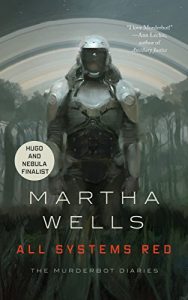 If you like characters who have their snark-o-matic turned up to 11 ALL THE TIME you’re going to love Murderbot. Because it’s snarktastic to the max and we get to spend the entire story inside its head as it thinks about just how much it would like to shove all the humans around it out the nearest airlock – or at least tie and gag them all so they stop getting in its way.
If you like characters who have their snark-o-matic turned up to 11 ALL THE TIME you’re going to love Murderbot. Because it’s snarktastic to the max and we get to spend the entire story inside its head as it thinks about just how much it would like to shove all the humans around it out the nearest airlock – or at least tie and gag them all so they stop getting in its way.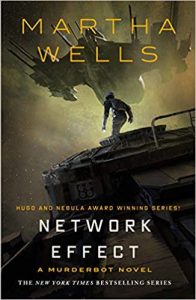 Escape Rating A: If you love Murderbot as much as I do, Fugitive Telemetry is a terrific opportunity to get back in touch with its snark. If you have not yet met Murderbot, this is not the place to begin your acquaintance. Start with
Escape Rating A: If you love Murderbot as much as I do, Fugitive Telemetry is a terrific opportunity to get back in touch with its snark. If you have not yet met Murderbot, this is not the place to begin your acquaintance. Start with 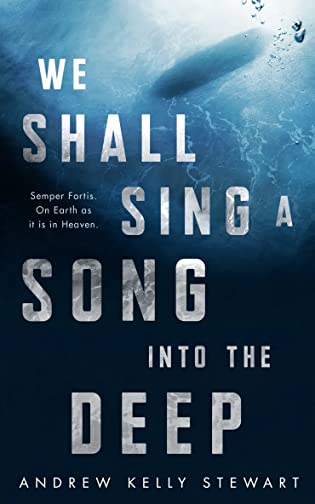 We Shall Sing a Song into the Deep by
We Shall Sing a Song into the Deep by  Escape Rating A-: Like A Canticle for Leibowitz, this is a story that combines the worship and rituals of a Catholic monastery with a post-apocalyptic world. Then it turns the rest of the classic story upside down.
Escape Rating A-: Like A Canticle for Leibowitz, this is a story that combines the worship and rituals of a Catholic monastery with a post-apocalyptic world. Then it turns the rest of the classic story upside down.